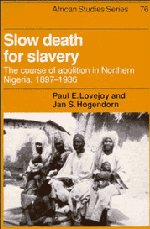Book contents
- Frontmatter
- Contents
- List of maps
- List of tables
- Preface
- 1 Slavery and the British conquest of Northern Nigeria
- 2 Fugitive slaves and the crisis in slavery policy
- 3 The debate on legal-status abolition
- 4 Emancipation and the law
- 5 Upholding proprietary rights to land
- 6 The role of taxation in the reform of slavery
- 7 The colonial economy and the slaves
- 8 The persistence of concubinage
- 9 Legal-status abolition: the final phase
- Appendix: Court records of slaves issued certificates of freedom
- Notes
- Glossary
- Bibliography
- Index
- Title in the series
6 - The role of taxation in the reform of slavery
Published online by Cambridge University Press: 03 May 2011
- Frontmatter
- Contents
- List of maps
- List of tables
- Preface
- 1 Slavery and the British conquest of Northern Nigeria
- 2 Fugitive slaves and the crisis in slavery policy
- 3 The debate on legal-status abolition
- 4 Emancipation and the law
- 5 Upholding proprietary rights to land
- 6 The role of taxation in the reform of slavery
- 7 The colonial economy and the slaves
- 8 The persistence of concubinage
- 9 Legal-status abolition: the final phase
- Appendix: Court records of slaves issued certificates of freedom
- Notes
- Glossary
- Bibliography
- Index
- Title in the series
Summary
As we have seen, the decision to enforce proprietary rights in land limited the mobility of male slaves. Before the colonial conquest, slaves could not easily find land because of the danger of slave raiding and kidnaping. Under colonial rule, male slaves continued to find it difficult to gain access to land, and therefore were kept close to their masters. The lack of access to land affected females as well because the Islamic legal system and conservative attitudes about marriage and concubinage meant that women could not easily relocate except in the company of males. Women were forced to remain in their masters' households unless a male or a relative, usually male, was willing to provide for their redemption and assure their subsistence thereafter.
Within a few years after the imposition of colonial rule, the various policies instituted to contain the flight of slaves and make them pay for their own redemption combined with colonial tax reforms in a manner that led masters and slaves into new economic relationships. These tax reforms are examined in this chapter. On the side of the masters, tax policy assisted in persuading them to establish financial arrangements resulting in the emancipation of their slaves. On the side of the slaves, taxes propelled them into cash-crop production, helped push others onto the labor market as wage earners, and sharply increased the numbers of traders in the dry season.
- Type
- Chapter
- Information
- Slow Death for SlaveryThe Course of Abolition in Northern Nigeria 1897–1936, pp. 159 - 198Publisher: Cambridge University PressPrint publication year: 1993

